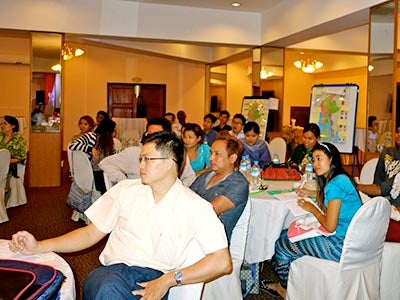The overall aim of the workshop was to initiate implementation of a HIV Prevention Package jointly developed by UNFPA, UNAIDS with the technical support from the Regional Advisor from Asia Pacific Regional Office (APRO) and the contribution of all the partners.
The prevention package is designed to guide programmers in implementing quality services and to increase access to these services for all. This workshop brought together people from different areas and sectors that are combating HIV / AIDS in various ways. “By working together, we have found out the gaps and difficulties in the HIV / AIDS prevention processes and brainstormed ways to overcome these issues,” said Dr. Ni Ni Khaing, UNFPA’s National Programme Officer on HIV/AIDS in Myanmar.
The four day workshop has helped to further strengthen partnerships of people living with HIV / AIDS and in awareness raising and prevention sectors. Julia Cabassi, UNFPA’s Regional Advisor on HIV/Most at Risk Populations (MARPs), stated that the workshop has helped the implementing partners, service providers, and key affected people networks in implementing the guidelines on the ground. “What is fantastic about this workshop is it brings together Government, national aids organizations such as National AIDS programme, NGOS, INGOs, and key infected populations. They are coming together to implement and launch the guidelines to make real on the ground the guidelines. We, UNFPA, want to support in the learning and implementation.”

The participants found the workshop very useful as it gave a clear understanding on the key elements mentioned in the prevention package. U Than Naing Oo from Population Service International (PSI) said the HIV prevention guidelines package has developed to fit to Myanmar context. “The guidelines will be a strong reference for the service providers like PSI and I believe it will help us to do our jobs more systematically and effectively.”
Participants included representatives from the Department of Health (MoH), National AIDS Programme (NAP), International Organization for Migration (IOM), Population Service International (PSI), Mary Stopes International (MSI), Save the Children, Malteser, Burtnet, Merlin, Health Policy and Administration (HPA), Première Urgence - Aide Médicale Internationale (PU-AMI), Médecins du Monde (MDM), Myanmar Nurses and Midwives Association (MNMA), Pyi Gyi Khin (PGK), Myanmar Transgender Network (MTN), Sex Workers in Myanmar (SWiM), Myanmar Positive Group, Myanmar Positive Women Network (MPWN), and National NGO Network (3N).



